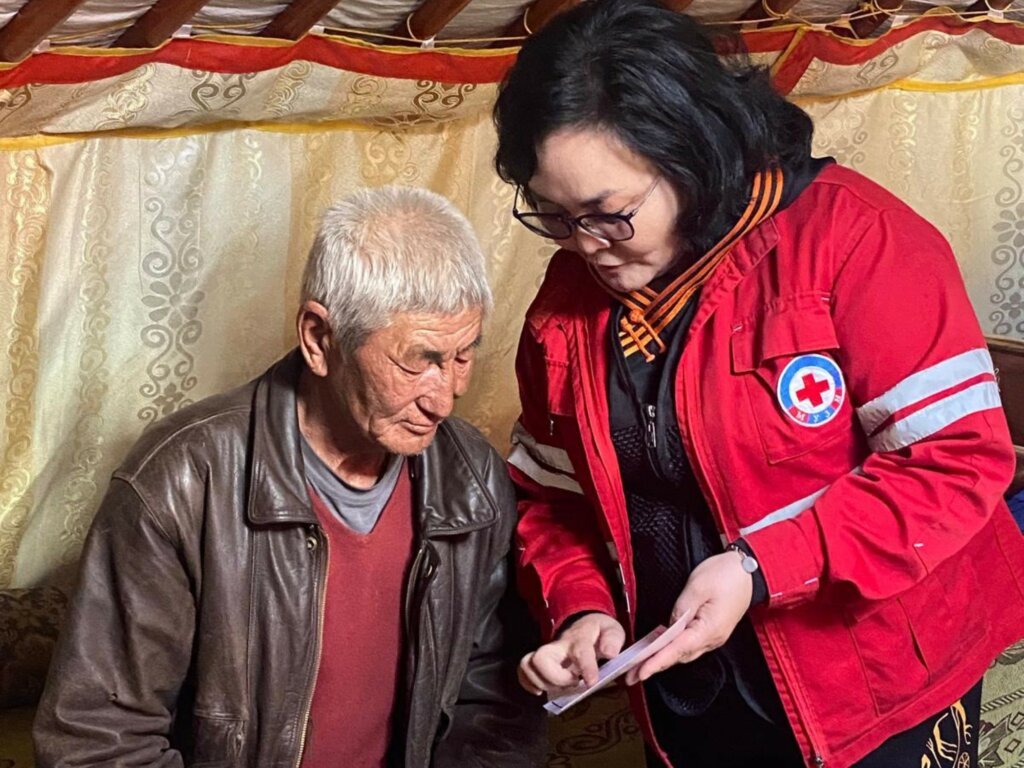
A partir de finales de 2023, Mongolia experimentó uno de sus inviernos más duros en casi un siglo. Como resultado, una amplia dzud — a compound hazard encompassing heavy snowfall, extreme cold, and windstorms — created treacherous living conditions for the livestock of herder communities across the country, leading to profound socioeconomic challenges. Integrating elements of Compromiso y responsabilidad de la comunidad (CEA) is vital in emergency settings such as this one, as it ensures that aid is tailored to the needs of affected communities. In response to this slow-onset disaster, our CEA Advisor Jonath Lijftogt was desplegado a Mongolia con la Federación Internacional de Sociedades de la Cruz Roja y de la Media Luna Roja (FICR) para ayudar al Cruz Roja de Mongolia con el apoyo a las familias de pastores durante este periodo y más allá.
“Integrating a CEA system into an emergency response operation from day one helps us to better serve people affected as it allows us to modify or amplify our interventions, improving trust and perceptions in the communities. Such enhanced trust helps National Societies to be stronger local humanitarian actors.”
Manish Tewani, Operations Manager at IFRC
Atender las necesidades en medio de riesgos crecientes
Upon Jonath’s arrival in Ulaanbaatar in April, the dzud had already ravaged the rural regions. The snow had melted and refrozen multiple times, trapping grass beneath layers of ice and making it inaccessible for livestock to feed on. As spring approached, those animals that had survived the brutal winter were frail and unable to access the fresh grass that had only just begun to grow. These unpredictable weather conditions left herder families in Mongolia, who often live in remote areas and almost exclusively rely on their livestock for income and food, in desperate need of support.

La respuesta se centró principalmente en apoyar a las familias de pastores con menos de 400 animales y sin fuentes adicionales de ingresos. La Cruz Roja de Mongolia, en colaboración con la FICR, distribuyó kits para el cuidado de los animales, dinero en efectivo y paquetes de alimentos a las familias de pastores para atender sus necesidades inmediatas. El gobierno mongol proporcionó heno y forraje para mantener a los animales supervivientes y despejó las carreteras bloqueadas por la nieve. Para mitigar el impacto psicológico causado por el dzud, que se manifiesta en depresión, estrés y mecanismos de afrontamiento negativos, el apoyo psicosocial fue parte integrante de la respuesta de emergencia.
CEA: implicar a las comunidades en la respuesta
Jonath’s role involved implementing CEA principles in this emergency response – essential in ensuring that the support provided meets the communities’ actual needs. In emergency responses, community engagement is vital to avoid leaving critical needs unmet. In this context, the CEA activities included joining distributions and visiting herder families, local community stakeholders, volunteers, and branch staff to gather concerns and identify gaps in the response:
“We saw people coming out of isolation, happy to see and talk to others again. There was relief because of the snow melting, but increased worry about the state of their animals. We also heard about how people were getting to distribution sites, and to what extent they knew of the support they received.”
Jonath Lijftogt, Asesor CEA de la Cruz Roja Neerlandesa
On more programmatic levels, Jonath mapped existing communication channels and feedback mechanisms already operated by the Mongolian Red Cross Society, such as their helpline for those in need of assistance. Based on the results, the analysis and visualisation of feedback data was introduced through a dashboard providing clear insights into community needs and questions. In addition, an information package was created for herders on how and where to access aid. CEA capacity building was a core part of Jonath’s deployment, with Mongolian Red Cross Society staff and volunteers strengthening their skills to implement CEA practices effectively in emergencies, ensuring that the voices of herder communities are heard and their needs met as best as possible. Moving forward, building on these skills will help strengthen the National Society’s operations.
“When I first took on the CEA role, Jonath’s support was invaluable in facilitating an engaging CEA training for everyone. Since then, we always try to ensure that each project or response provides clear and transparent information. That way, people affected know how to participate in our humanitarian programmes more actively.”
Namkhai Gerelt-Od, punto focal CEA en la Cruz Roja de Mongolia
La CEA como herramienta clave para construir el futuro
Al implicar activamente a las personas en la toma de decisiones e incorporar sus comentarios, el CEA ayuda a generar confianza y a mejorar la eficacia de los esfuerzos humanitarios. Aumenta la transparencia y capacita a las comunidades para participar en su recuperación, fomentando relaciones más sostenibles y soluciones adaptadas a las necesidades locales. En situaciones de crisis, este enfoque garantiza que la ayuda sea más eficiente, inclusiva y ajustada a las necesidades reales de los afectados. Si bien la respuesta inmediata al dzud ha concluido, las lecciones aprendidas y los cambios a largo plazo implementados durante esta operación garantizarán que la Cruz Roja Mongola esté bien preparada para apoyar de manera óptima a sus comunidades en cualquier desastre futuro.
Queremos conocer su opinión.
¿Le interesa saber más sobre los despliegues de emergencia en el Movimiento Internacional de la Cruz Roja y de la Media Luna Roja, o sobre nuestra labor de CEA? Póngase en contacto con
Coordinador de Servicios, Apoyo en Emergencias: Jacopo Margutti jmargutti@redcross.nl
Asesor, Compromiso con la Comunidad y Rendición de Cuentas: Jonath Lijftogt jlijftogt@redcross.nl